 What Is a License Plate Reader and Can Police Track You Using It?
What Is a License Plate Reader and Can Police Track You Using It?
Table of Contents
- Oregon License Plates
- Oregon License Plate Design and Formats
- Oregon Vanity License Plate
- Most Popular License Plate in Oregon
- Oregon License Plate Lookup
- What Do I Need to Get a License Plate in Oregon?
- Differences Between a Passenger License Plate and a Commercial License Plate in Oregon
- How to Renew License Plate in Oregon
- How to Transfer a License Plate in Oregon
- Oregon License Plate Lookup Frequently Asked Questions (FAQ)
 Oregon License Plates
Oregon License Plates
An Oregon license plate is a metallic plate affixed to the front or back of a motor vehicle. It contains a unique alphanumeric code on the plate, allowing immediate vehicle recognition. Owning and displaying license plates is mandatory for all motor vehicles, including cars, trucks, trailers, motorcycles, and mopeds operating on Oregon roads. Failure to display a valid license plate violates Oregon law and may result in fines, vehicle impoundment, and other penalties.
Oregon license plates are issued by the state's Driver and Motor Vehicle Services (DMV) of the Oregon Department of Transportation (ODOT). Depending on the type of vehicle, the vehicle may qualify for more than one license plate type. Oregon law requires one license plate to be issued to mopeds, trailers, campers, antique vehicles, motorcycles, and special interest vehicles. The state issues two license plates to all other vehicles. Vehicles issued with one license plate are required to display the plates at the rear.
The Oregon Driver and Motor Vehicle Services issues the following types of license plates:
- Standard Plates
- Disabled Veteran and Ex-POW Plates
- Veteran Plates
- Specialty Plates
 Oregon License Plate Design and Formats
Oregon License Plate Design and Formats
The "tree" license plate is the standard-issue license plate for Oregon. The license plate depicts a dark green Douglas Fir in the center. The license plate was introduced in 1988, with a slight design modification in 1990 and another in 2004. The license plate has its serial embossed in a dark blue color on a mountain skyline with lavender mountains and light blue sky. It has the word "Oregon" screened in dark blue centered at the top.
The "Oregon Gray Whale" license plate, which went on sale in February 2019, has a white design on a two-shade blue background. It features a mother gray whale and calf swimming just below the surface of an ocean and a small lighthouse at the upper left corner of the design.
The "Smokey Bear" license plate went on sale in August 2019 and features a white serial on a forest green background, changing to light green in the shape of a forest silhouette at the top. A portion of the face of Smokey Bear is printed on the left, and the words "Keep Oregon Green" are screened at the bottom.
The "Watch for Wildlife" license plate is one of Oregon's newest license plate designs. It went on sale in May 2022 and features a dark blue serial on a multicolored background, a mule deer on the left, and Mount Hood prominently on the right-hand side of the background.
Standard license plates:
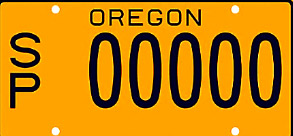
Other common Oregon license plates:
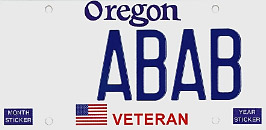
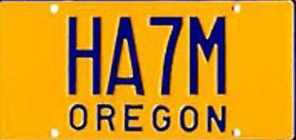
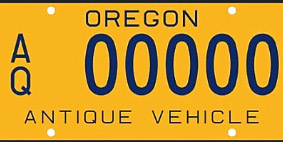
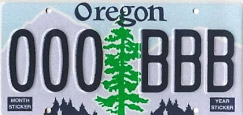
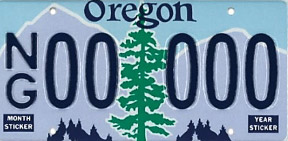
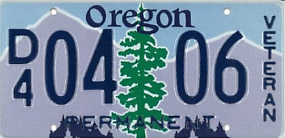
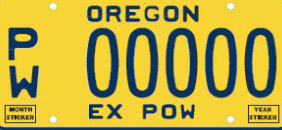
* Source: Oregon Driver and Motor Vehicle Services
 Oregon Vanity License Plate
Oregon Vanity License Plate
Oregon vanity plates are license plates customized by the customers and approved by the Driver and Motor Vehicle Services of the Department of Transportation. The Department of Motor Vehicles (DMV) does not issue multiple sets of plates with identical combinations of letters and numbers. Additionally, the DMV reserves the right to reject requests for combinations of letters and numbers that could be considered offensive. These offensive combinations include those that may alarm, threaten, offend, or mislead a reasonable person through the use of foreign languages, slang words or phrases, phonetic, numeric, or reverse spelling, or when viewed as a mirror image. Examples of such combinations may involve, but are not limited to:
- Refer to intimate parts of the body or excretory or sexual functions
- Refer in an offensive or alarming manner to a person or class of persons based on gender, color, race, ethnic heritage, national origin, or other characteristic
- Refer to illegal acts
- Refer to controlled substances or paraphernalia used in the consumption of controlled substances or alcoholic beverages
- Suggest that the vehicle to which the vanity plate is issued is an official vehicle of a public entity when it is not
Vanity plates can have up to six characters and one extra space or hyphen. Except for the hyphen, no punctuation marks or special characters are allowed, including #, !, $. Motorists are required to follow these requirements when applying for vanity plates:
- You must have at least one number or letter. Each block can have a letter, hyphen, number, or be blank
- You cannot use three letters followed by three numbers or three numbers followed by three letters
- Be specific about the locations of any spacing in the combination selected
- If you use all six blocks and intend to use a space or hyphen, draw an arrow to show where you want it
To apply for a vanity license plate, take a completed Custom Plate Application, a title or registration application to a local DMV office or mail them to:
1905 Lana Avenue NESalem OR 97314
Vanity plates cost $50 annually. This fee is in addition to the plate fee, registration fee, and any applicable surcharge for special plate backgrounds. The following surcharges for Oregon base plates:
- Crater Lake: $30 surcharge at initial plate issuance
- Salmon, Wine Country: $30 surcharge at initial plate issuance and each renewal. $60 Salmon surcharge at four-year initial issuance
- Gray Whale, Pollinator Paradise, Trail Blazers, Smokey Bear, UO Duck, Watch for Wildlife: $40 surcharge at initial plate issuance and each renewal
- Cultural: $50 surcharge at initial issuance and each renewal
Alternatively, you can check the availability and apply for custom plates online on the Oregon website. Your vanity plate will be sent to you as soon as it is received from the manufacturer. The processing time is a minimum of 6-8 weeks. For more information on Oregon vanity plates, contact the DMV by calling the Department's Customer Assistance line at (503) 945-5000 or (503) 299-9999 (Portland).
Note that the DMV will make your vanity plate available to another applicant if:
- You do not renew your vanity plate within 30 days after it expires
- Your vanity plate and registration are canceled by DMV for reasons other than the above
- You surrender your custom plate to the DMV
 Most Popular License Plate in Oregon
Most Popular License Plate in Oregon
The most popular license plates in Oregon are:
- Amateur (HAM) Radio Operator
- Non-Commissioned Officers Association
- Oregon Professional Firefighters
- Paralyzed Veterans of America
- Share the Road
- Vietnam Veterans of America
- Crater Lake
- Wine Country
- Salmon
- Fallen Public Safety Officer
- Oregon State University
- Gray Whale
- Pollinator Paradise
- Smokey Bear
- Trail Blazers
- UOAA Ducks
- Watch for Wildlife
- Cultural
- Pacific Wonderland
- Antique
- Special Interest
- National Guard
 Oregon License Plate Lookup
Oregon License Plate Lookup
License plate lookup in Oregon refers to the process of accessing information related to a vehicle using its license plate number. This information can include details about the vehicle's registration status, make, model, year, and color.
An Oregon license plate lookup can be conducted to verify the history of a used vehicle before purchasing it to ensure it has not been involved in any criminal activity or has any outstanding issues, such as liens or theft reports. Moreover, law enforcement agencies may conduct license plate lookups as part of their investigative procedures to track down suspects or vehicles involved in crimes.
In Oregon, you can find information about vehicles registered to license plates by contacting the Oregon Department of Motor Vehicles (DMV) directly or using Recordsfinder a third-party service.
Oregon Reverse License Plate Search
An Oregon reverse license plate lookup functions similarly to a standard license plate lookup. You can conduct a reverse license plate lookup for the same reasons as a license plate search, such as finding information about a vehicle's history.
Recordsfinder offers a convenient means for conducting reverse license plate lookups in Oregon. Users can access relevant details such as vehicle history, and vehicle specification by providing the license plate number.
 What Do I Need to Get a License Plate in Oregon?
What Do I Need to Get a License Plate in Oregon?
You can obtain an Oregon license plate by titling and registering your vehicle with the Driver and Motor Vehicle Services. To title your vehicle, mail or bring to a local DMV office:
- A completed Title Application. If you are titling a passenger vehicle, such as a car, pickup, or SUV, the Oregon DMV recommends that you use its guided DMV2U application
- Original title or vehicle ownership document. If it is a new vehicle, a Certification of Origin is required. If the title is lost, and:
- The car was manufactured in 2011 or newer and requires an odometer disclosure; you must obtain a replacement title before transferring the title
- The vehicle is manufactured in 2010 or older, tick the Replacement Oregon Title box in the Certifications section of the application
- Was not issued by Oregon; contact that state to obtain a replacement prior to applying for an Oregon title
- Original releases or bills of sale from previous owners
- Original lien releases from previous security interest holders
- An odometer disclosurebetween you and the seller, if required (maybe on a separate disclosure form or in the transfer area on the title)
- If the vehicle has a foreign or out-of-state title, a vehicle identification number inspection for $9 (This can be done during your title appointment at DMV)
- If you purchased the vehicle from a dealer not located in Oregon and the car is brand new or has up to 7,500 miles, you may require a Use Tax Certificate
- Other requirements based on your location, vehicle type, or situation
- The title fee, registration fee, and plate fees. If you are titling a passenger vehicle, you may use the DMV fee calculator to find your applicable fees
To submit your application:
- Schedule an appointment at a DMV office or walk in to wait on standby
- Mail documents and fees to:
1905 Lana Ave NE
Salem OR 97314
Note that if you want to register your vehicle and are in a DEQ area, the vehicle must pass a DEQ emissions test. However, newer vehicles are exempt. For more information on titling and registering a vehicle in Oregon, see the vehicle title and registration page of the Department of Transportation website.
 Differences Between a Passenger License Plate and a Commercial License Plate in Oregon
Differences Between a Passenger License Plate and a Commercial License Plate in Oregon
Commercial vehicles are issued with commercial license plates, not Oregon's standard passenger license plates. The state differentiates a commercial vehicle from a passenger vehicle by defining the former in ORS 801.210 as a vehicle used for the transportation of persons for compensation or designed or used primarily for the transportation of property. However, it excludes emergency vehicles, motor homes, fire trucks, and recreational vehicles operated only for personal use. In contrast, per ORS 801.199, a passenger vehicle is a vehicle weighing 10,000 pounds or less combined weight and is used for personal purposes.
Here are the key differences between passenger and commercial license plates in Oregon:
| Features | Passenger License Plate | Commercial License Plate |
|---|---|---|
| Purpose | Identifies personal vehicles used for non-commercial purposes | Identifies vehicles used for commercial purposes (transporting passengers or cargo for profit) |
| Fees | Standard fees apply | Fees vary depending on the vehicle type |
| Requirements for obtaining | Standard vehicle titling and registration process with the Oregon DMV |
You can title your commercial vehicle and register heavy trucks or permanent fleet vehicles up to 26,000 pounds or over 26,000 pounds if it is:
The Commerce and Compliance Division issues most commercial vehicle registration |
 How to Renew License Plate in Oregon
How to Renew License Plate in Oregon
You can renew your license plates by renewing your vehicle registration with the Oregon DMV. The DMV allows Oregon motorists to renew their registrations online, by mail, at a DMV Office, or the DEQ.
To renew your registration online, visit the DMV2U portal on the DOT website. Print or keep an electronic image of your receipt to serve as your proof of registration for up to 30 days. If the DEQ on your renewal notice is marked "Yes", you must go to DEQ or DEQ Too business location to test.
To renew your registration by mail:
- Pass an emissions test at the DEQ if you are in a DEQ area
- Fill out an application or your renewal notice
- Calculate your fees
- Mail your documents and the appropriate fees (pay by check or money order made out to "DMV") to:
Attn: Renewal
1905 Lana Ave NE
Salem, OR 97314
To renew in person at a DMV office:
- Pass an emissions test at the DEQ if you are in a DEQ area;
- Bring an application or your renewal notice; and
- Bring cash, a credit or debit card, check, or money order to pay the fees
You can also renew your vehicle registration at a DEQ if your vehicle has to get an emissions test and pass the test. You should bring a debit or credit card, check, cash, or money order to pay the fees. Also, your renewal reminder will be required. Note that you cannot renew your registration at DEQ if you do not have your renewal reminder, want to change your license plates, or have moved since your renewal reminder was printed.
 How to Transfer a License Plate in Oregon
How to Transfer a License Plate in Oregon
You can transfer your Oregon license plates to another vehicle if they are:
- Going on the same kind of vehicle. For instance, motorhome plates can only be transferred to another motorhome
- A plate-style currently issued by the Oregon DMV, special plates, or custom plates
- Readable
Consequently, if you are the current or previous owner identified on the title of the vehicle from which the license plates were removed, the vehicle registration period stated on the plates transfers with the plates onto the vehicle. If you are not the previous or current owner of the vehicle the license plates were removed from, all registration requirements, fees, and the $30 license plate transfer fee are required. If you are unsure whether your plates can be transferred, contact the Oregon DMV.
To apply for a license plate transfer:
- Complete the Application for Registration, Renewal, Replacement, or Transfer of Plates and Stickers
- Mail the completed application and $30 (payment may be made by check or money order) to:
1905 Lana Ana NE
Salem, OR 97314
Note that if your registration has expired or you are not the DMV records owner of the vehicle the plates were removed from, you must complete a vehicle registration renewal.
 Oregon License Plate Lookup Frequently Asked Questions (FAQ)
Oregon License Plate Lookup Frequently Asked Questions (FAQ)
Can I Get a Replacement for My Lost License Plate in Oregon?
You can obtain a replacement license plate in Oregon if your current plate has been stolen or lost. You can apply online via the DMV2U portal to get a replacement plate if you have an Oregon title in your name. Alternatively, you can complete an application, choose your plates, and pay the required fees. Mail the completed application and fees (payable by check or money order made out to the DMV) to:
DMV Services1905 Lana Ave NE
Salem, OR 97314
What Do Police See When They Run Your License Plates in Oregon?
When Oregon police run a license plate, they typically have access to information such as:
- The vehicle's registration status
- Vehicle specifications (including make, model, year, and color)
- Outstanding warrants
- Stolen vehicle alerts
What Is the Penalty for Driving with an Expired License Plate in Oregon?
Per ORS 803.455, failure to renew vehicle registration is categorized as a Class D traffic violation. In accordance with ORS 153.019, the presumptive fine for a Class D violation is $115. Hence, if you are caught driving with an expired license plate, you may be charged with a traffic violation and fined $115.
Do I Need to Return License Plates in Oregon?
You do not need to return license plates in Oregon, as the state allows you to transfer your license plate from an old vehicle to a new one as long as both are of the same class. If you have sold your vehicle and do not intend to transfer the plate, the DMV recommends surrendering it to your local DMV office or destroying it.
Can I Keep My Oregon License Plate If I Move to Another State?
You may keep your Oregon license plate if you are moving out of the state permanently. Alternatively, you may voluntarily surrender it to your local DMV office or destroy it.
What Size Are License Plates in Oregon?
Oregon license plates follow typical plate dimensions in the United States. Oregon's standard issue plates measure 12 inches in length and 6 inches in height.
How Long Can You Drive with Temporary License Plates in Oregon?
In accordance with Chapter 735-150-0060 of Oregon statutes, a designated vehicle dealer who collects and submits title and registration fees to DMV on behalf of a purchaser may issue a temporary registration permit for a vehicle that the dealer sells, pending receipt of permanent registration plates from DMV. Temporary registration permits or plates are valid for a period not exceeding 90 consecutive days from the date they are issued or until plates and, if applicable, stickers are received from DMV and placed on the vehicle, whichever occurs first.
However, a temporary registration permit may only be issued if all applicable title, registration, and plate transfer fees have been collected and a title and registration application are submitted to the DMV by the dealer on behalf of the vehicle owner. A designated dealer may not issue a temporary registration permit until a Department of Environmental Quality (DEQ) Certificate of Compliance, if needed, has been obtained. Nevertheless, a trip permit may be issued as provided in OAR 735-150-0070(1)(b) and (6)(b) if the vehicle must be taken to a DEQ inspection station.
What Are the Steps to Renew a License Plate in Oregon?
To renew your license plates, you may renew your vehicle registration by mail or in person. To renew by mail:
- Pass an emissions test at the DEQ if you are in a DEQ area
- Fill out an application or submit your renewal reminder
- Calculate your fees
- Mail your documents and the applicable fees (pay by check or money order made out to "DMV") to:
Attn: Renewal
1905 Lana Ave NE
Salem, OR 97314
To renew your vehicle registration in person:
- Visit a DMV office
- Pass an emissions test at the DEQ if you are in a DEQ area
- Bring an application or your renewal notice
- Bring cash, a credit or debit card, check, or money order to pay the applicable fees
What Do I Do If My License Plate Is Lost or Stolen in Oregon?
If your Oregon license plate is stolen or lost, you can obtain a replacement plate by applying online or by mail:
- Filling out an application
- Selecting your plates and paying the appropriate fees
- Mail the completed application and fees to:
1905 Lana Ave NE
Salem, OR 97314




